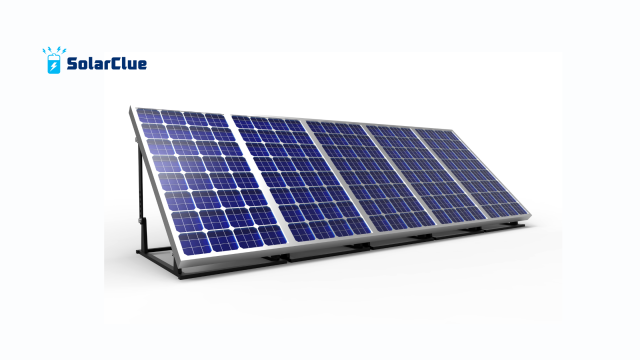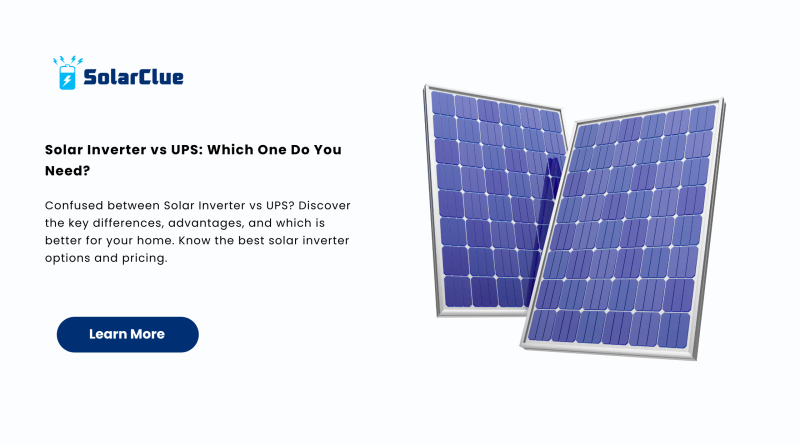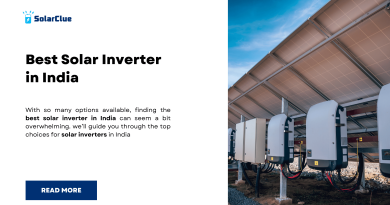Solar Inverter vs UPS: Which One Do You Need?
Choosing between a Solar Inverter vs UPS can be tricky, especially when you’re investing in a backup power solution for your home or business. Both devices provide electricity during power outages, but their operation, efficiency, and benefits differ significantly. Let’s explore the differences to help you make a well-informed decision.
Table of Contents
- 1 What is a Solar Inverter?
- 2 What is a UPS?
- 3 Core Differences Between Solar Inverter and UPS
- 4 Efficiency & Cost Effectiveness
- 5 Backup Duration
- 6 Maintenance Requirements
- 7 Installation & Complexity
- 8 Use Case Comparison
- 9 Which Is More Reliable?
- 10 Environmental Impact
- 11 Smart Features in Modern Solar Inverters
- 12 Market Trends and Adoption
- 13 Government Incentives and ROI
- 14 Buying Tips: How to Buy Best Solar Inverter
- 15 Popular Brands Offering Best Solar Inverter
- 16 Final Thoughts
- 17 FAQs
What is a Solar Inverter?
A Solar Inverter is a critical component of a solar power system. It converts direct current (DC) from solar panels into alternating current (AC) that powers household appliances. Modern solar inverters often come with smart features like remote monitoring, high conversion efficiency, and hybrid capabilities.
What is a UPS?
An Uninterruptible Power Supply (UPS) provides backup power from batteries during power outages. It’s commonly used to protect electronic devices such as computers, routers, and medical equipment from unexpected shutdowns. Unlike solar inverters, UPS systems are not typically integrated with renewable energy sources.
Core Differences Between Solar Inverter and UPS
1. Power Source
- Solar Inverter: Powered by solar energy via photovoltaic panels
- UPS: Powered by electrical grid and internal batteries
2. Functionality
- Solar Inverter: Converts solar energy and stores excess in batteries for later use
- UPS: Offers instant power backup for a short duration, mainly for critical devices
3. Sustainability
- Solar Inverter: Eco-friendly and helps reduce electricity bills
- UPS: Relies entirely on the grid, offers no renewable energy benefit
Efficiency & Cost Effectiveness
When comparing solar inverter price to that of a UPS, solar inverters may seem expensive initially. However, in the long term, they save money through reduced electricity bills and government subsidies on solar installations. You can buy best solar inverter models on SolarClue.com with attractive deals.
Backup Duration
- UPS provides short-term power—usually under an hour—depending on battery capacity.
- A solar inverter, especially a hybrid one, can offer extended backup by recharging batteries using sunlight.
Maintenance Requirements

UPS systems require regular battery maintenance and have a shorter lifespan. On the other hand, solar inverters have fewer moving parts and longer service lives. If you’re searching for the best solar inverter for home, always check for warranties and service availability.
Installation & Complexity
UPS installation is relatively straightforward. However, solar inverter installation involves solar panels, a charge controller, and batteries. This initial complexity pays off with long-term energy independence and savings.
Use Case Comparison
When to Choose a UPS:
- If you need instant, short-term backup
- Budget constraints restrict initial investment
- Primary use is for electronics like PCs, routers
When to Choose a Solar Inverter:
- Long-term energy savings is a goal
- Eco-conscious power usage
- You want to invest in a solar power system
Which Is More Reliable?
In terms of reliability during long power cuts, solar inverters clearly win. They can recharge during the day and provide power through the night, making them a dependable solution for rural or semi-urban areas.
Environmental Impact
Solar inverters contribute to a cleaner planet by reducing dependence on fossil fuels. If sustainability matters to you, choosing the best solar inverter is the smart move.
Smart Features in Modern Solar Inverters
- Wi-Fi connectivity for remote monitoring
- MPPT (Maximum Power Point Tracking)
- Hybrid compatibility with grid and batteries
- Energy usage analytics
Explore the full range of smart solar power system products on blog.solarclue.com to get started with your journey.
Market Trends and Adoption
With rising electricity costs and increased awareness about climate change, solar inverters are quickly becoming a household staple. People are searching for the best solar inverter for home that offers scalability, affordability, and efficiency.
Government Incentives and ROI
In India and other countries, governments offer subsidies for installing solar systems. This significantly reduces the solar inverter price and improves the return on investment.
Buying Tips: How to Buy Best Solar Inverter
- Assess your power needs
- Look for MPPT technology
- Check for brand reputation and reviews
- Confirm warranty and service support
- Compare options at solarclue.com
Popular Brands Offering Best Solar Inverter
- Luminous
- Microtek
- Growatt
- SMA
- Huawei
These brands offer products that cater to different budget ranges and feature requirements.
Final Thoughts
If you’re still on the fence about Solar Inverter vs UPS, ask yourself: Do I want just backup power, or a long-term energy solution? For short-term needs, a UPS might suffice. But for sustainable, cost-saving, and scalable power, a solar inverter is undoubtedly the better choice.
Visit solarclue.com to explore the best deals and models available for your needs.
FAQs
Q1. Can I use both UPS and solar inverter together?
Yes, but it requires careful system design to avoid overlap and inefficiency.
Q2. What is the average solar inverter price in India?
Prices range from ₹5,000 to ₹1,00,000 depending on capacity and features.
Q3. Which is the best solar inverter for home use?
Brands like Luminous and Microtek offer reliable home solutions.
Q4. Is solar inverter better than UPS?
For long-term savings and eco-friendliness, yes, solar inverter is better.
Q5. Where can I buy best solar inverter online?
You can find top options at solarclue.com and get expert guidance at blog.solarclue.com.
Still have questions or want to explore options tailored to your needs? Visit our website solarclue.com and get expert help today!




